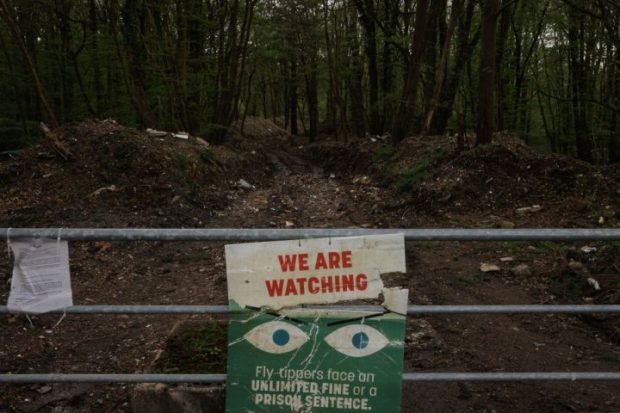Easter Sunday. I went to church for the first time in ages. The little parish church has stood for 900 years in a village near where my parents live. It’s where my father James, who died last week aged 75, will be buried. It was a friendly, pomp-free service of the pragmatic sort – dogs were welcome, and there were tables with colouring-in pens to keep the kids occupied during the Eucharist. There was an easter-egg hunt in the graveyard afterwards.
Pathetic fallacy is a bitch. While my dad was dying, outside the window of his bedroom the wet Wiltshire spring went indifferently about its business. Now, with my dad a week gone, the sun is out and the sky blue. New lambs are cantering unsteadily in the field on the other side of the garden fence. The skirts of the treeline are full of bluebells and daffs. Everything taunts us with new life.
The reading in church was from the resurrection story, as told in the gospel of St John: Mary Magdalene, finding the stone rolled away from the tomb; Mary, confronting the man she takes for the gardener; and the man saying to her: ‘Mary.’ What a freight of feeling there is in that simple pair of syllables.
It’s funny: I found myself tearing up at these familiar points of the story. (Well, maybe not funny: maybe entirely predictable. Last week a YouTube video of the Ukulele Orchestra covering ‘Teenage Dirtbag’ had me in floods.) Even if what it describes never happened, there’s such beauty in the yearning it encodes, and in the generation after generation that have stood in this same place to affirm faith in it or to share that yearning. Here is Larkin’s vast, moth-eaten musical brocade, nothing to be derided.
At the same time, I was inwardly, priggishly disappointed that the gospel reading in this service was in a modern translation. Years of compulsory chapel in C of E schools, somewhat resented, have burned the sombre cadences of the King James Version into me. It occurs to me, with a shade of self-reproach, that in the first place I have no right whatever as an atheist to take a view on the form a Christian service should take – and that in the second, on the evidence of this if I’d been born a few centuries earlier I’d probably have been in favour of seeing William Tyndale burned at the stake for translating the Bible into English.
Yet I do take a view. I don’t think I’m alone in it. The thumbprint of the church is on me. That, I think, is what I identify in myself as cultural Christianity. The historian Tom Holland, among others, has made an eloquent case that we in the West live in a deeply Christian world even where we do not profess the faith. Secular liberal universalism, or whatever you want to call it, comes out of the Sermon on the Mount. The shape of Christian ethics is the shape of our secular ethics. It’s personal as well as societal. To be culturally Christian means to live a life without a shred of faith – yet knowing that the God in whom you don’t believe is the one who died on the cross at Golgotha.
It’s knowing that your father, who also did not believe, nevertheless felt the value of ritual to the human creature – and that to sing ‘Guide Me, O Thou Great Redeemer’ and ‘I Vow To Thee, My Country’ over his coffin will not be just a social formality or a hypocritical hat-tip, but will supply a comforting connection to the deep rhythms of history, to patterns of stories and of language that go back through the years. These stories, these rituals, are rich because they hold meaning in many more ways than the literal.
Poetry supplies the same connection. When we were openly distressed in front of him in the week before he died, my father would say: ‘All shall be well, and all manner of thing shall be well.’ Julian of Norwich by way of T S Eliot: solace passed across the centuries hand to hand from the dead to the living. Also in his mind were fragments of Yeats: ‘I shall arise and go now.’ We’ll read the closing lines of “Little Gidding’ and ‘The Lake Isle of Innisfree’ at his funeral.
Also, we’ll play some music from the soundtrack of his favourite film, Top Gun. Sublime; ridiculous. Something very ordinary is happening here, something very unremarkable, something that has happened in every church in every generation since a man she took to be a gardener said: ‘Mary.’
I’d like to sit with a takeaway pizza on my lap and watch that movie with him again, crank the sound up and see the excitement on his face as the tomcats jump off the deck of the carrier in the opening minutes. But you know: Goose doesn’t come back. The tomb in Palestine is not the porch of spirits lingering. It sucks to be a Christian who doesn’t believe. I don’t hold out for the resurrection of the body or the promise of life everlasting. I want my Dad to be still alive.
Got something to add? Join the discussion and comment below.
Get 10 issues for just $10
Subscribe to The Spectator Australia today for the next 10 magazine issues, plus full online access, for just $10.





















Comments
Don't miss out
Join the conversation with other Spectator Australia readers. Subscribe to leave a comment.
SUBSCRIBEAlready a subscriber? Log in